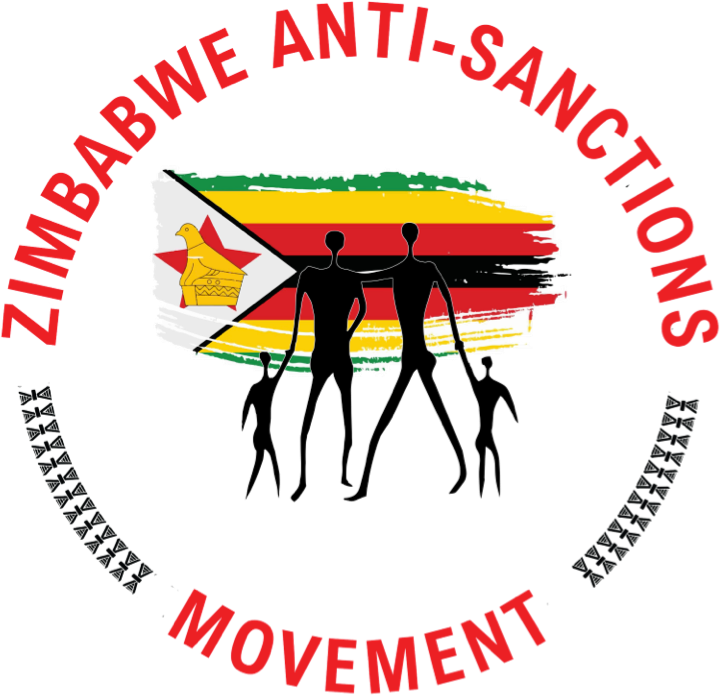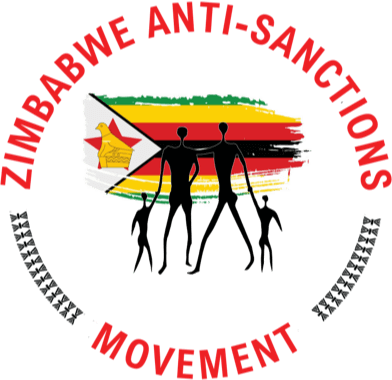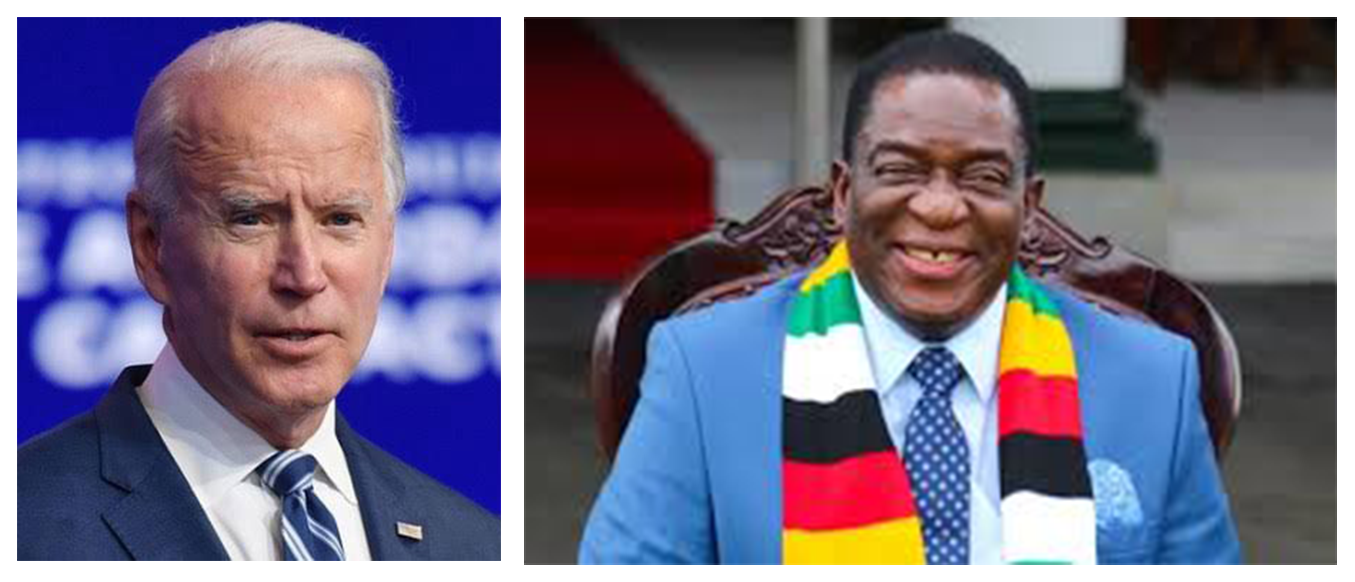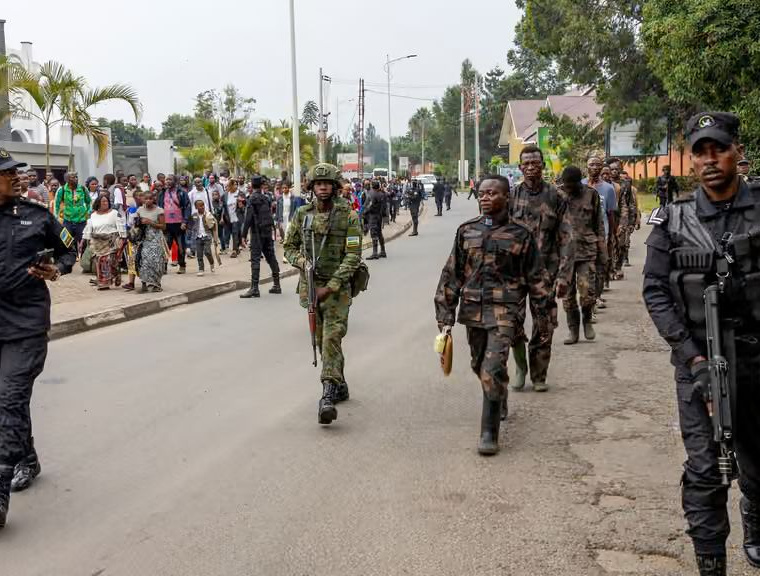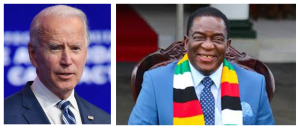
Yesterday, on the 4th of March, 2024, Zimbabwe crossed an important hurdle with the removal of the executive order sanctions that have been crippling the country for the past 21 years.
Despite this great achievement, we have heard many anti-Zimbabwean activists purporting that the removal of executive order sanctions on the country is not a significant development because of the remaining ZDERA sanctions and the recently added Global Magnitsky Human Rights Accountability Act, upon eight individuals and two companies, which they purport have the same effect as the executive order sanction.
Nothing could be further from the truth, as the removal of the executive order sanctions on Zimbabwe is tantamount to the removal of 99% of all sanctions on Zimbabwe: government, municipalities, parastatals, investors, entrepreneurs, civilians, business, banks, insurers, industry, mines and farms.
More importantly, the removal of the executive order sanctions comes with the reversal of the national emergency declared upon Zimbabwe. Through this declaration, the U.S. President and his security departments, designated Zimbabwe an unusual and unequivocal threat to the United States of America’s economic, foreign policy, and security interests.
This declaration meant that Zimbabwe became an enemy of the United States, this necessitated the neutralization of this threat by either economic or military weapons. And as we know, the U.S. government chose to deploy the economic weapons of “war” and “defense” in the form of the IEEPA (International Emergency Economic Powers Act).
So, in short, the declaration made by Joe Biden yesterday, cancelling the national emergency upon Zimbabwe, alongside IEEPA and the three executive order sanctions, means Zimbabwe now ceases to be an enemy of the United States, and because the country ceases to be a threat to US interests, the “war” and “defense” sanctions imposed by the International Emergency Economic Powers Act now fall away.
The implication of this is huge because it means that now, the U.S. is no longer at war (economic war) with Zimbabwe, in a manner where, if the economic weapons had failed to neutralize the threat that Zimbabwe was perceived to pose, there was a prospect that the U.S. President could inform Congress that Zimbabwe’s threat under the use of economic weapons (IEEPA) had not subsided, and thus he was now declaring another national emergency to put boots on the ground to neutralize the threat with the only other option: military action.
What many Zimbabweans have failed to appreciate is that the national emergency on Zimbabwe was a declaration of war and was just one declaration and one notification to Congress, away from invasion. This is the reason why the country (Zimbabwe) was almost invaded thrice by the U.S. and NATO in the last 23 years since sanctions were imposed. Albeit, now, with the removal of the national emergency, that threat of invasion has been significantly diminished, overnight.
This is especially telling when you consider that since the National Emergency Act was enacted in 1979, 86% of all national emergencies declared specifically in aggression upon nations by the U.S., have all degenerated from sanctions into either civil unrest, CIA sponsored civil destabilization, military intervention and forced regime change within the second and third decade of sanctions. Suffice to say, a few of those countries fell in less than a decade after they were designated threats to the United States. This just goes to prove that US executive order sanctions, in most cases turned into the destruction of the sanctioned nation.
History shows that Somalia, Yugoslavia, Afghanistan, Iraq, Libya, Syria were all invaded within less than two decades of having a national emergency declared upon them and going under U.S. executive order sanctions.
Now meditate on the fact that three national emergencies of the 38 national emergencies declared on nations by the United States since 1979. were declared on Zimbabwe, and yesterday, on the 4th of March, 2024, without any war or destabilization of the country, the executive orders were removed.
The fact that the American President and government no longer see Zimbabwe as a threat that needs to be neutralized by economic weapons and if that fails, war, is a very significant development. It’s a huge victory for us as a nation to escape such stringent sanctions without invasion or bloodshed.
Not only is it significant, but it is fortune-changing for all Zimbabweans because it removes the threat of invasion and the risk profile that came with a country under economic attack and the threat of possible invasion by a superpower like the U.S., if and when it decided that economic weapons were not working and now needed to be escalated to military intervention.
In addition, the removal of these sanctions also removes the threat of criminal prosecution and confiscation of property of any American and non-American entity or person who decides to invest in Zimbabwe, clear funds, process funds, give loans, sell goods, sell technology and materially assist Zimbabwe, without a license from the U.S. Secretary of State or OFAC.
Now, to really understand what the removal of executive order sanctions means, we need to go back and recap what executive order sanctions are, how they were used to cripple the Zimbabwean economy and what they were intended to achieve.
It’s difficult to really appreciate the implication of the end to executive order sanctions without understanding the regime of sanctions and how they were supposed to impact the economy.
The History of Executive Order Sanctions In Zimbabwe.
In December 2001, Zimbabwe was officially put under the first formal congressional sanctions of the Zimbabwe Democracy Economic Recovery Act or ZDERA, which enjoined U.S. directors in multilateral lending institutions to vote against Zimbabwe getting loans or receiving debt cancellation from those multilateral institutions.
The point that many miss in the ZDERA document is, it stipulates that the act only came into being in 2001 after previous and similar sanctions were imposed on Zimbabwe between September 1999 and September 2000 after western countries instructed their directors in the IMF (International Monetary Fund) and International Development Association (IDA) to vote to deny Zimbabwe already approved loans from these institutions, even before Zimbabwe defaulted on its repayments. This was done in retaliation to the spontaneous land reform that had begun in Zimbabwe, and after western powers and the Zimbabwean government failed to reach a compromise at the Land Donor Conference that had been requested by the west, to keep land in white hands.
In February 2000, the World Bank followed suit and suspended all technical assistance and previously approved loans to Zimbabwe. So essentially, by the end of 2000, Zimbabwe was effectively under unofficial sanctions which prohibited it from getting any loans from multilateral lending institutions.
In March 2001, Senators Joe Biden, Hillary Clinton and Jesse Helms then sponsored a bill deceptively coined Zimbabwe Democracy and Economic Recovery Act (ZDERA), which in December of the same year imposed sanctions extraterritorially and extrajudicially upon the Zimbabwean government and its people.
The intention of these sanctions was tailored to deny the Zimbabwean government access to multilateral lending institutional loans and technical support, deny it balance of payment support, funds to under take land reform, development and reconstruction loans for reconstruction of the country from the liberation war and apartheid destabilization. This, in order to bring suffering to the Zimbabwean people so as to discourage them from voting for Robert Mugabe in the March 11, 2002 elections.
The ultimate goal, however, was to stop land reform either by denying the government money to undertake it or the removal of the government advocating for it.
However, it must be pointed out here that, even though the Zimbabwean government was now being denied multilateral loans, which oftentimes were more expensive than loans from the money market, the government of Zimbabwe could still, as it can now with the easing of executive order sanctions, borrow money from private banks and private funders. So come 2002, Robert Mugabe won the Presidential elections and at this point the Americans realized that denying the Zimbabwean government loans from multilateral lending institutions through ZDERA, had not stopped land reform, it had failed to deprive new farmers of seeds and inputs which were distributed by a special military task team, hence cotton and tobacco actually broke records soon after those sanctions.
As a result of this business as usual environment, industry continued to function, farmers were producing under land reform, food was on tables, fuel was flowing, people were not screaming and uprising, the Mugabe government was still receiving taxes and thus the 2002 election failed to remove Mugabe to stop land reform.
Introduction Of Executive Order Sanctions.
With ZDERA having failed to coerce the Zimbabwean voter to vote out Mugabe, on March 6, 2003, George Bush decided to increase the pain upon the citizens of that country by declaring a national emergency upon 80 key business people, industrialists, investors, politicians and farmers, designating them an unusual and unequivocal threat to U.S. interests.
That was accompanied by terms that prohibited the world from doing business with them and anyone who does business with them (government which received taxes from these designated people and procures services from them, was tacitly targeted). Anyone who did business with them risked being arrested in America, having their property confiscated, being put under secondary sanctions or being penalized a huge amount of money.
Once these Zimbabweans were identified as a threat to the U.S., a “war” and “defense” economic weapon: the IEEPA (International Emergency Economic Powers Act) was deployed to neutralize the threat by:
1. Prohibiting the clearance of their funds, payments for exports or payments for machinery any U.S. and non-U.S. financial institutions that want to do business in the U.S or her allies,
2. Prohibiting US and non-US investors and funders who want to do business with the U.S. or her allies from providing them funds and assistance.
3. Barring U.S. companies from providing software, tools, technology, machines, inputs, logistic and material assistance without a license from the U.S. Secretary of State and or OFAC.
With these executive orders, the west forecasted that the Zimbabwean economy would collapse in two years and regime change by protests would be guaranteed.
The consequences for trading with Zimbabwe became a deterrent to some businesses and investors in Zimbabwe. Western multinational companies with very high compliance standards became the first to leave, and no doubt many left because of bilateral pressure put on their governments and them by the U.S. behind the scenes.
Top-tier investment companies, funders and banks under pressure from their U.S. underwriters, saw the risk profile of Zimbabwe rising to limits set by their risk management models and policies, so they stopped lending to Zimbabwe. Currency fluctuations followed and fuel shortages began. However, as bad as it was becoming, there were still adequate loopholes to allow many businesses to continue operating in Zimbabwe.
By 2005, although many local and international companies and investors had divested from Zimbabwe and the economy was struggling, it was still chugging along and citizens were not revolting to make way for western intervention.
To aggravate the situation, that same year, George Bush rationalized his sanctions list, removing non-key targets and declaring a second national emergency upon an additional 80 strategic people seen as aiding the ZANU PF government or allies of the first targets, who were perceived to be keeping the economy afloat.
This impacted the economy to a point of collapse, but even then, the opposition of Zimbabwe failed to take power in the 2008 elections, and the people did not revolt against their government.
It is at this point that George Bush escalated the sanctions to the worst level where they targeted all Zimbabweans by prohibiting any American or non-American who wants to do business in America or its allies’, from doing business with the government of Zimbabwe, its local governments, parastatals of that government, its companies, those private businesses that do business with the above government and these that do business with these private companies.
In all practicality, sanctions which could be adjudicated at the discretion of the U.S. President were now on anyone and everyone since most Zimbabweans did business with the Zimbabwean government by paying taxes.
This led to overcompliance as no one wanted to risk doing business with Zimbabwe. The arbitrariness and extraterritorial reach of these sanctions was displayed when the U.S. government sanctioning Zimbabwean citizens like Sandra Mpunga, Kuda Tagwirei, Obey Chimuka and their companies in 2021 and 2022, for undertaking their citizen obligation of starting businesses and materially assisting their government, yet they are not US citizens.
Impact Of The Executive Order Sanctions.
The sanctions now made it difficult for the Zimbabwean government and its parastatals to get loans, acquire tools, replacement parts, fuels, lubricants, medicines, hospital equipment, parts to repair old broken-down equipment.
In the case of IDC which had bought many abandoned private companies and factories, it became difficult for them to pay for imported machines, tools, replacement parts, lubricants, modern technology and chemicals to clean water. And since they couldn’t get chemicals to purify water, they were even denied loans to build a plant to manufacture water purification chemicals by IDC South Africa. National Railways and ZESA struggled to get parts to repair broken down equipment from the likes of ABB and General Electric, so their infrastructure went unmaintained and the public was deprived of critical services.
Not only did it affect government but with sanctions prohibiting any financial institution from clearing Zimbabwean US dollar payments to import material or payments for exports coming to the country without license from the U.S. government, private companies too could not buy new machines, replacement parts, inputs, technology or software to improve their production to compete with South African and Chinese products.
Even the Minerals Marketing Corporation of Zimbabwe and its various front companies had proceeds of mineral exports confiscated and blocked for years, till now, to a point where many mining companies whose payments were blocked, went out of business.
Between 2012 and 2022, many local and foreign banks were not willing to carry the accounts of Zimbabwean government, parastatals, politically exposed persons and local businesses without license from OFAC, so those people and entities got debanked.
On traveling overseas, many Zimbabweans were denied banking services or even something as mundane as foreign exchange because they were flagged as persons associated to politicians, former government officials, listed people or politically exposed persons.
During that same period, over 108 leading global banks simply cut corresponding banking relations with Zimbabwean banks, the latest of which we saw when Deutsche Bank broke from Stanbic Bank in 2021. Many US, UK, EU and Japanese banks also closed the bank accounts of the Reserve Bank of Zimbabwe within the past decade, due to overcompliance with executive order sanctions which sought to isolate Zimbabwe from the monetary system and global trade.
It was not only banks that were overcomplying and implementing sanctions, but even Western insurance companies refused to insure companies exporting even ambulances from the UK and EU to Zimbabwe, out of fear of being sanctioned, criminally charged or losing their assets as they saw happening to the daughter of the owner of Huawei, after that company did business with Iranian companies.
It is these broad sanctions on Zimbabwe’s government, municipalities, parastatals, banks, financial institutions, industry, mines, farms, civil society organizations, and by deduction all Zimbabweans, that are called executive order sanctions, which were removed yesterday, freeing Zimbabweans from the ball and chain that was drowning them.
Benefits Of The Removal Of Executive Orders.
The culmination of this development is, now US banks and foreign banks that want to do business with the United States or that previously feared criminal prosecution or penalties for doing business in Zimbabwe, are no longer under threat for clearing Zimbabwean US dollar, Euro, Yen and western aligned currency payments from the Zimbabwean government, parastatals, government companies and companies that do business with them (which is all companies in Zimbabwe that pay tax), as before when the sanctions were in effect.
Therefore, the Zimbabwean government, parastatals, companies, investors and citizens, for the first time in 21 years, can now use their banks in Zimbabwe to conduct quick and efficient international payments and transfers to purchase medicines, medical equipment machines, industrial machines, replacement parts, tools, inputs, chemicals, software, lubricants and technology through these banks. Today they can even solicit international loans and get them.
Additionally, going forward, our government can now easily acquire tools and technicians to repair our broken hospital equipment (cancer machines and dialysis machines), NRZ infrastructure and rolling stock and the broken machines at defunct ZESA power stations, to increase our electricity supply crisis. The ripple effect from that is future growth of investment and energy supply in Zimbabwe due to availability of electricity supply.
Where necessary, both our government and private sector can now replace obsolete machines and technology to provide services to Zimbabweans and make our production more competitive.
When required, they can now borrow capital at globally competitive interest rates, as the risk premium that was on Zimbabwean loans due to sanctions, now falls aways. Investment companies and financiers that left Zimbabwe and stopped lending it money because it was to high risk, can now begin to see Zimbabwean parastatals, companies and municipalities as investment grade assets once again.
This is bound to increase investments, production efficiency, asset utilization, research and development, competitiveness of Zimbabwean industry, local content production, employment, healthcare, education, public services and tax collection, especially in a country where people have learnt to produce under very punitive, stringent and costly conditions.
This access to machines, cheap capital and better efficiencies and the competitive advantage derived from Zimbabweans creating an optimal mix of western and eastern technology configurations, is bound to see Zimbabwean industry grow astronomically and outcompeting many countries in the region.
With the cancellation of executive order sanctions, leading machine, software, tool and technology companies, will no longer deny Zimbabwean companies their technology and machines. Hence, the nation can actively work towards retooling, refurbishing and reequipping critical entities like ZISCO steel, our city thermal power stations and National Railways, to create new needed jobs and capacity.
Equally, private investors can now form partnerships with the Zimbabwean government, parastatals, private companies as our companies are no longer stuck with relying only on Chinese and eastern companies. But now, we can shop around and compare and negotiate better deals with our longstanding allies using competitive quotes.
It also means American investors and non-American investors that want to do business with the United States and her allies, can now invest over $50 000 into Zimbabwe without license from the U.S. Secretary of State or OFAC. This will attract more foreign investment into Zimbabwe and all we have to do is manage the risks that brings.
Companies and persons can now supply their products and even offer materially assist to the Zimbabwean government, local government, parastatals and Zimbabwean companies without a license from the US Secretary of State and or OFAC.
Foreigners can also now manage the assets and properties of Zimbabweans in and outside the country and across the world, without requiring a license from the Secretary of State as the sanctions schedule enjoined in section III titled: Prohibited Transactions in the Zimbabwe Sanctions Program for executive order sanctions.
Banks across the world can now hold accounts for, and transact with the Reserve Bank of Zimbabwe which had over sixteen of its accounts closed globally in just the last ten years. The same is true for all Zimbabwean government parastatals, Zimbabwean government companies, the government of Zimbabwe, our municipalities and those who do business with them.
Zimbabwe can begin to reconstitute US dollar, Euro, Yen and other leading currency corresponding banking relationships, to facilitate the easy flow of money and international trade. This will enable the country to pay for machines, tools, inputs, medicines and equipment.
Unlike before, when a parastatal like IDC was denied over $20 million in loans by IDC South Africa in 2014, due to overcompliance with illegal sanctions. This parastatal which focuses on industrial development and the Zimbabwe Mining Development Corporation which focuses on developing mining, can now once again go onto the open market to source funds, debentures, and loans to grow these sectors of the economy.
Now, the IDC can source the funds it needed for Complex Corporation to develop a factory to produce water cleaning chemicals to make it easier for our municipalities to purify their water. The same applies to municipalities which can now also go on the global money market to seek loans, funding, and partnerships to refurbish our dilapidated water purification and piping infrastructure, to once again pump water into people’s homes and turn our cities into world-class cities.
In the case of organizations like Small and Medium Scale Development Corporation and Minerals Marketing Corporation of Zimbabwe which have had over $10 million confiscated and held by OFAC. After this decision, such monies can now be released back to the country.
Over the 21 years of these executive orders, many Zimbabwean companies have had their monies frozen in similar ways, in numerous banks across the world and now the Zimbabwean economy is about to receive a significant inflow of such funds, which will boost the economy.
Last year, we visited ZISCO Steel where they informed us that one of their more viable subsidiaries Zimchem, had over $60,000 in export payments held by First National Bank of South Africa , pending due diligence before clearance. Many such delays to payments were happening on a daily basis under executive order sanctions, however, going forward, Zimbabwean payments will be cleared in real-time from the system, without any delays.
The only problem is it seems like the West is trying to use anti-money laundering and counter-terrorism regulations to slow down payments to third world countries and their enemies, in the same way sanctions are doing and we need to address this.
So, the removal of executive order sanctions on Zimbabwe is a monumental development because it essentially means that the Zimbabwean economy is now figuratively “open for business”, as it now has access to free trade, free and fair access to money markets, and has the right to trade with the world unhindered.
Why Were These Sanctions Removed?
From our analysis, these sanctions were removed due to the pressure emanating from the United Nations doing an assessment of Zimbabwean sanctions and declaring them illegal and a violation of human rights.
This report then augmented the regional anti-sanctions campaign by SADC, that saw SADC countries, the AU and the U.S’. biggest African ally, South Africa, denounce the sanctions and demand their removal because they were hurting the entire SADC region.
Alongside this, these sanctions got the leading Zimbabwean opposition: CCC, labeled Western puppets (or puppets of imperialism) for calling for these sanctions upon their people. As a result, they have lost political capital on the continent and no African leader takes them seriously, except the Zambian President.
Additionally, our civil society organization ZASM, that wrote the anti-sanctions strategy that was followed by the region and lobbied for the above actions, took legal action in South African courts against this collective punishment and persecution of civilians (a crime against humanity).
This legal case in South Africa led to Joe Biden himself responding to ZASM’s court application, where he intimated that he was claiming immunity from the South Africa government’s Department of International Relations and Cooperation.
In ZASM’s response to Biden’s paper which were filed last week, they notified him that his application for immunity would be challenged in the same way AfriForum challenged Grace Mugabe’s application for immunity, after she beat up a South African lady. This challenge would be on the basis that Biden was abusing his immunity and powers by issuing executive orders that forced South African companies to disregard South African laws and implement illegal sanctions without due process, on the threat of criminal prosecution and other punitive measures, if they did not implement these illegal sanctions.
All this pressure against the US government’s collective punishment of civilians, by depriving them of their rights to life, healthcare, food, water, and social services, and our (ZASM’s) discussion with an advisor of Congress in April 2021, was enough to compel the U.S. Congress Sub-committee on Human Rights, Health, and Organization in May, 2021, to undertake an impact assessment of U.S. sanctions on civilian health and human rights in Zimbabwe and Africa as a whole.
And once the congressional impact assessment exposed the fact that U.S. sanctions were affecting civilian human rights and health -which the U.S. government was obliged to remedy according to UN sanction rules- this left the U.S. government owing Zimbabwean civilians, reparations for 19 years of this crimes against humanity.
The subcommittee assessment report was clear that the United States could no longer justify persecuting civilians by depriving them of their basic human rights, in the name of punishing purported human rights violations by government officials.
Compounding this was the Iranian 2018 challenge of unilateral U.S. sanctions on the country, and the recent South African government’s ICJ case launched against Israeli genocide and war crimes in Palestine.
In both cases, the same court found in favor of Iran and South Africa against the Americans and their ally Israel. These judgments and the lobbying of ZASM, ran the risk of pushing the Zimbabwean government to also approach the same world court against legal sanctions that were persecuting innocent Zimbabweans.
Seemingly, all these factors and the need to maintain its rules based system, left the U.S. government with no option but to remove its illegal, human rights violating sanctions to save face.
Do ZDERA And The Magnitsky Act Have The Same Impact As Executive Orders.
Now, for better understanding, the reader needs to recall that ZDERA sanctions were the first sanctions to be imposed on Zimbabwe officially by the United States in 2001, however, the government of Zimbabwe being deprived of multilateral loans since September ,1999, failed to achieve the desired results of the sanctions sender.
It is precisely because denying the government of Zimbabwe multilateral loans was not effective at crippling the Zimbabwean economy, that the U.S. government felt the need to declare three national emergencies upon Zimbabwe to impose three “war” and “defense” sanctions, targeted at the engine of the economy, to handicapthe Zimbabwean economy.
So, inasmuch as ZDERA remains, its impact is minimal because the Zimbabwean government and economy are not dependent on getting loans from multilateral institutions, but private banks and funders whose loans tend to be less parasitic and politically coercive. Moreover, lately, the same government has been using private public partnerships and concessions to develop infrastructure like the Beitbridge border post, Mbudzi Interchange and road rehabilitation, without borrowing.
Additionally, considering that ZDERA sanctions rely on directors of the U.S. who sit on the board of these multilateral financial institutions, to vote against Zimbabwe to deny it loans and debt cancellation; Joe Biden being the President and one of the sponsors of ZDERA, could simply instruct directors in these institutions not to vote against Zimbabwe. He can also ask them to abstain from voting or recuse themselves from any deliberations that involve Zimbabwe, as they are currently doing in the African Development Bank deliberations over loans to Zimbabwe. This would essentially mute ZDERA even before Congress repeals it.
On the Magnitsky Act. It appears that the imposition of the act was a means to save face by the almighty U.S. government, so that they don’t seem like they have been forced to capitulate to the anti-sanctions pressure from Zimbabwe, ZASM and other African countries, to remove their illegal sanctions that were perpetuating a crime against humanity. It also was a way to maintain their ruse that their sanctions regimes are not on the civilians of a nation, but leaders who perpetuate corruption and violate human rights, hence the words “Human Rights” are forged into sanctions that violate fundamental human rights to fair trial.
But, in all honesty, can any Zimbabwean attest to how the first billionairess in Zimbabwe, Sandra Mpunga, Obey Chimuka, Zimbabwe’s billionaire Kuda Tagwirei and their companies have violated Zimbabwean human rights or undertaken corruption? Besides, where were they and any other persons on the list, ever tried and given an opportunity to defend themselves before they were subjected to the extrajudicial and extraterritorial punishment of illegal unilateral sanctions?
Despite the Magnitsky Act being titled the Global Magnitsky Act, it’s not international law, but it’s U.S. law being applied unilaterally and extraterritorially to punish people of a sovereign nation without trial. This makes these sanctions as illegal and human rights violating as the executive order sanctions that were just removed, but no where close to being as effective.
The only wrong the likes of Chimuka, Tagwirei, and Mpunga committed, is circumventing sanctions and growing into being billionaires and multimillionaires, and then using their wealth to invest in Zimbabwe and materially assisting the Zimbabwean government to mitigate sanctions and keeping the economy moving. This is why they are now being labeled corrupt because the west had assumed that Zimbabwe would fold under sanctions in a few years and they would then return to take up all the opportunities.
So, what will the impact of these now individually targeted Magnitsky sanctions be? The fact is almost everyone on the Magnitsky sanctions was already under the executive order sanctions, and so these additional sanctions will not really change much for them, as they have adjusted to them and no longer have money in hostile jurisdictions. However, if Joe Biden’s cancellation of the executive order sanctions is to be followed, any property of theirs blocked or frozen by the executive orders through the years, they should be released and handed back.
It’s sad to see that only leading black business people and their companies were targeted by these illegal sanctions, yet white business people who were implicated for money laundering in the Panama papers and those with criminal records for fraud in South Africa and who displace locals to plant sugarcane, are exempt from the same sanctions. This makes one wonder whether the sanctions on these black people are just intended to ensure that Zimbabwe’s economy remains in the hands of the west and its agents.
Finally, it is now up to those that have been put under these new illegal sanctions to firstly write to the U.S. government, demanding their removal from the Magnitsky sanctions which are punishing them without trial, a blatant violation of the universal bill of rights. Then as a nation, we need to sit and focus on suing the Americans for reparations and damages for persecuting innocent Zimbabweans with illegal sanctions that perpetuated a crime against humanity for 23 years and robbed the country of over $100 billion and millions of lives.
Nevertheless, one debate has been settled once and for all. The fact that the President, his Vice, the Minister of Defense and some ministers were put under these sanctions, is an unfortunate indication that the so punted reengagement failed, while legal action and pressure activism by the likes of ZASM were very successful.
Written by Rutendo Bereza Matinyarare, Chairman of ZASM.
